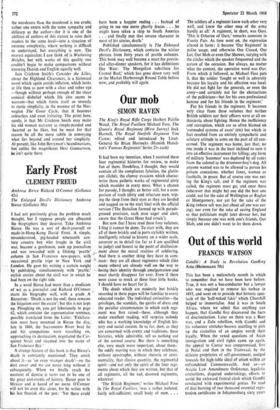Early Frost
CLEMENT FREUD
Ambrose Bierce Richard O'Connor (Gollancz 42s) The Enlarged Devil's Dictionary Ambrose Bierce (Gollancz 30s) of wit as a journalist and Richard O'Connor starts his biography well, with a grade A• ' Bierceism: 'Death is not the end; there remains lion must have mounted in Bierce the day, late in 1866, the Sacramento River boat he and his companions were travelling on, approaching its destination, negotiated the Car- quinez Strait and steamed into the water of San Francisco Bay.'
A strange feature of this book is that Bierce's death is constantly mentioned. They smirk about ft—as 'an eve,n stranger death'—on the dust cover and we are never long without it subsequently. When we finally reach the moment of demise it turns out to be one of the great non-events of history. Bierce goes to Mexico and is heard of no more. O'Connor will not let even this alone, for he writes with his last flourish of the pen: 'Yet there could thought, but I suppose people are allocated aware that the Great Hour had struck').
In a word Bierce had more than a modicum I should have no heart for it. have been a happier ending . . . Instead of going to see one more ghastly fracas . . . he might have taken a ship to South America . . . and finally met that unseen character in most of his stories, death.'
Published simultaneously is The Enlarged Devil's Dictionary, which contains the wittier phrases from forty years of prattle columns. This book may well become a must for provin- cial after-dinner speakers, for it has definitions like `Rice: The Mongolian substitute for Corned Beef,' which has gone down very well at the Market Harborough Round Table before now, and probably will again.






































 Previous page
Previous page